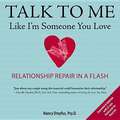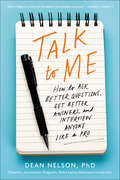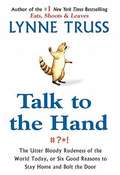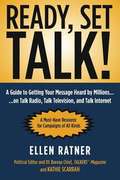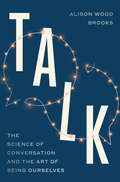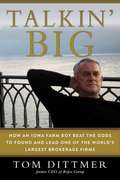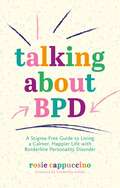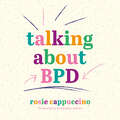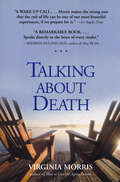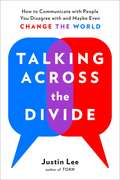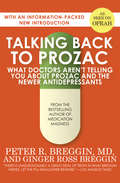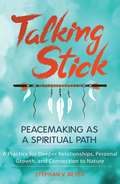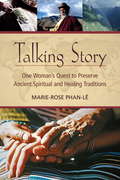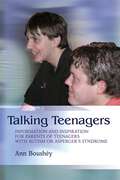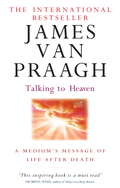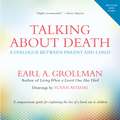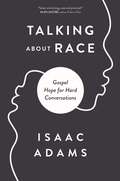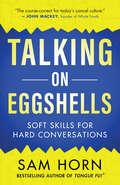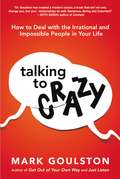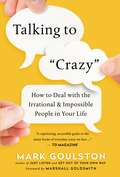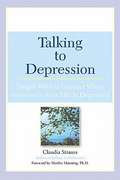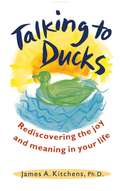- Table View
- List View
Talk to Me Like I'm Someone You Love: relationship repair in a flash
by Psy. D. Nancy DreyfusThe most crucial relationship advice book since Men Are from Mars. " - Erin Meanley, Glamour. com A groundbreaking, interactive relationship tool that literally places in the hands of couples the power to transform chronically frustrating relationship dynamics. We've all been there. A conversation with a loved one escalates into conflict. Voices rise to a fever pitch and angry, accusative words fly through the air. At times like these, it seems impossible to find the magic words that will lead to healing. Enter Talk to Me Like I'm Someone You Love. A psychotherapist with decades of experience in counseling couples, Nancy Dreyfus hit upon the revolutionary practice outlined in this book during a couples-therapy session in which a wife's unrelenting criticism of her husband was causing him to become emotionally withdrawn. In the midst of this, Dreyfus found herself scribbling on a scrap of paper, "Talk to me like I'm someone you love" and gestured to the husband that he should hold it up. He did and within seconds the familiar power differential between the two shifted, and a gentler, more genuine connection emerged. Dreyfus was startled, then intrigued, and then motivated to create a tool that could help others. This elegantly packaged spiral-bound book features more than one hundred of Dreyfus's "flash cards for real life"-written statements that express what we wish we could communicate to the person we love, but either can't find the right words or the right tone in which to say it. The statements include: *Taking responsibility: "I realize I'm overreacting. Can you give me a minute to get sane again?" *Apologizing: "I know I've really hurt you. What can I do to help you trust me again?" *Loving: "You are precious, and I get that I haven't been treating you like you are. " A one-of-a-kind, practical relationship tool, Talk to Me Like I'm Someone You Love will help couples to stop arguing and begin healing. .
Talk to Me: How to Ask Better Questions, Get Better Answers, and Interview Anyone Like a Pro
by Dean Nelson“The perfect guide to interviewing . . . anyone who speaks with fellow humans to acquire information will find Nelson’s guidance priceless.” —Tom Foster, New York Times–bestselling author of How to Read Literature Like a ProfessorInterviewing is the single most important way journalists (and doctors, lawyers, social workers, teachers, human resources staff, and, really, all of us) get information. Yet to many, the perfect interview feels more like luck than skill—a rare confluence of rapport, topic, and timing. But the thing is, great interviews aren’t the result of serendipity and intuition, but rather the result of careful planning and good journalistic habits. And Dean Nelson is here to show you how to nail the perfect interview every time. Drawing on forty-years of award-winning journalism and his experience as the founder and host of the Writer’s Symposium by the Sea, Nelson walks you through each step of the journey from deciding whom to interview and structuring questions, to the nitty gritty of how to use a recording device and effective note-taking strategies, to the ethical dilemmas of interviewing people you love (and loathe). He also includes case studies of famous interviews to show how these principles play out in real time. Chock full of comprehensive, time-tested, gold-standard advice, Talk to Me is a book that demystifies the art and science of interviewing. “One of the best interviewers around.” —Anne Lamott, New York Times–bestselling author of Help, Thanks, Wow
Talk to the Hand: The Utter Bloody Rudeness of the World Today, or Six Good Reasons to Stay Home a nd Bolt The Door
by Lynne Truss"Talk to the hand, 'cause the face ain't listening," the saying goes.When did the world stop wanting to hear? When did society become so thoughtless? It's a topic that has been simmering for years, and Lynne Truss says it's now reached the boiling point. <P><P>Taking on the boorish behavior that for some has become a point of pride, Talk to the Hand is a rallying cry for courtesy. Like Eats, Shoots & Leaves, Talk to the Hand is not a stuffy guidebook, and is sure to inspire spirited conversation.Why hasn't your nephew ever thanked you for your carefully selected gift? What makes your contractor think it's fine to snub you in the midst of a major renovation? Why do crowds spawn selfishness? <P>What accounts for the appalling treatment you receive in stores (if you're lucky enough to get a clerk's attention at all)? Most important, what will it take to roll back a culture that applauds those who are disrespectful? In a recent U.S. survey, 79 percent of adults said that lack of courtesy was a serious problem. For anyone who's fed up with the brutality inflicted by modern manners (or lack thereof), Talk to the Hand is a colorful call to arms--from the wittiest defender of the civilized world.
Talk!
by Ellen Ratner Kathie Scarrah"Ready, Set, Talk!" will help anyone-from the novice activist to the sophisticated public relations professional-develop a talk media message, prepare a campaign, and roll it out. The authors demystify the process of identifying and analyzing potential media targets and opportunities, and show readers how to develop media events for maximum attention and continuing exposure on talk media. Rich with real-life examples and anecdotes on how to-and how not to-execute a successful campaign, this revealing media manual pulls no punches. Ratner and Scarrah analyze the conservatives' success on talk media and explain how anyone can do the same, not just by creating their own show, but also by going head to head with others on highly successful existing shows. "Ready, Set, Talk!" is a roadmap to putting the internet, podcasting, and videocasting to work for ideas, causes, and candidates. It includes guidelines for print and television interviews; a step-by-step guide to selecting, booking, and preparing a spokesperson; a comprehensive idiot-proof promotional checklist; and advice on how to manage crises in the media.
Talk: The Science of Conversation and the Art of Being Ourselves
by Alison Wood BrooksA groundbreaking book that reveals the hidden architecture of our conversations and how even small improvements can have a profound impact on our relationships in work and life—from a celebrated Harvard Business School professor and leading expert on the psychology of conversation.&“Alison Wood Brooks brings to life the science of conversation, in which she is a world expert, with the utmost warmth, empathy, and joy.&”—Angela Duckworth, #1 New York Times bestselling author of GritAll of us can struggle with difficult conversations, but we&’re often not very good at the easy ones either. Though we do it all the time, Harvard professor Alison Wood Brooks argues that conversation is one of the most complex, demanding, and delicate of all human tasks, rife with possibilities for misinterpretation and misunderstanding. And yet conversations can also be a source of great joy, each one offering an opportunity to express who we are and learn who others are—to feel connected, loved, and alive.In Talk, Brooks shows why conversing a little more effectively can make a big difference in the quality of our close personal relationships as well as our professional success. Drawing on the new science of conversation, Brooks distills lessons that show how we can better understand, learn from, and delight each other. The key is her TALK Maxims:Topics: Choose topics and manage them wellAsking: Ask more questionsLevity: Use humor to keep conversations fizzyKindness: Prioritize their partners conversational needsThrough experiments ranging across the conversational spectrum—from speed daters who ask too few questions (or too many), to future business leaders averse to topic forethought, to traffic stops that reveal the essence of kind language—Brooks takes us inside the world of conversation, giving us the confidence and the advice to approach any interaction with more creativity and compassion.Addressing our face-to-face conversations as well as those we have by phone, email, text, and social media, Talk is a thoughtful guide for anyone seeking to better establish and sustain their relationships. From managing our emotions and sparking creativity to navigating conflict and being more inclusive, the right conversation skills just might be the key to leading a more purposeful life.
Talkin' Big: How an Iowa Farm Boy Beat the Odds to Found and Lead One of the World's Largest Brokerage Firms
by Dittmer TomIn Talkin’ Big, Tom Dittmer—former CEO of Refco, the United States’ first world-renowned futures firms—recalls how with hard work, determination, optimism, and some good old-fashioned luck, he was able to able to achieve his greatness. Growing up as a farm boy in small-town Iowa, Dittmer first made a name for himself as a Lieutenant in the U.S. Army. His industry and potential were quickly noticed, and Dittmer rapidly rose to become a White House aide under Lyndon B. Johnson. After an honorable discharge, Dittmer moved to Chicago with his new wife, Frannie, where he, from the Chicago Union Stockyards, first learned of the wealth of potential that that the Chicago Stock exchange held. In 1969, he got into the business world himself, forming the Ray E. Friedman & Co., —Refco—with this father. And from there, Dittmer’s fortunes only rose. Making millions, taking Refco to the international stage, and hobnobbing with celebrities, Dittmer became a legend in his own right, all while staying true to himself and his Midwest roots. Brimming with fascinating business insights and incredible inside stories, Talkin’ Big is a true rag-to-riches story of one of America’s greatest businessmen.
Talking About BPD: A Stigma-Free Guide to Living a Calmer, Happier Life with Borderline Personality Disorder
by Rosie Cappuccino'I am Rosie. I have BPD. I am not an attention-seeker, manipulative, dangerous, hopeless, unlovable, 'broken', 'difficult to reach' or 'unwilling to engage'. I am caring, creative, courageous, determined, full of life and love.'Talking About BPD is a positive, stigma-free guide to life with borderline personality disorder (BPD) from award-winning blogger Rosie Cappuccino.Addressing what BPD is, the journey to diagnosis and available treatments, Rosie offers advice on life with BPD and shares practical tips and DBT-based techniques for coping day to day. Topics such as how to talk about BPD to those around you, managing relationships and self-harm are also explored. Throughout, Rosie shares her own experiences and works to dispel stigma and challenge the stereotypes often associated with the disorder.This much-needed, hopeful guide will offer support, understanding, validation and empowerment for all living with BPD, as well as those who support them.
Talking About BPD: A Stigma-Free Guide to Living a Calmer, Happier Life with Borderline Personality Disorder
by Rosie Cappuccino'I am Rosie. I have BPD. I am not an attention-seeker, manipulative, dangerous, hopeless, unlovable, 'broken', 'difficult to reach' or 'unwilling to engage'. I am caring, creative, courageous, determined, full of life and love.'Talking About BPD is a positive, stigma-free guide to life with borderline personality disorder (BPD) from award-winning blogger Rosie Cappuccino.Addressing what BPD is, the journey to diagnosis and available treatments, Rosie offers advice on life with BPD and shares practical tips and DBT-based techniques for coping day to day. Topics such as how to talk about BPD to those around you, managing relationships and self-harm are also explored. Throughout, Rosie shares her own experiences and works to dispel stigma and challenge the stereotypes often associated with the disorder.This much-needed, hopeful guide will offer support, understanding, validation and empowerment for all living with BPD, as well as those who support them.(P) 2021 Jessica Kingsley Publishers
Talking About Death
by Virginia MorrisEven in this candidly confessional age, we've been conditioned to avoid discussions of death. Our youth-worshipping culture does everything to deny death, which is why, when the end nears, most of us are inadequately prepared to deal with it. And the cost of that is great: many are haunted by memories of how inappropriately or painfully or uncomfortably their parents and grandparents died. Many of us avoid even considering the options, in all their complexity, that we will most likely face one day, given our new longevity and the profound advances in medicine. With its wise and very compelling argument that all of us, at any age, can and should face death before it faces us, Talking About Death addresses the cultural, personal, medical, and legal concerns that are necessary for us--as individuals and as a society--to prepare for a good death, a death where the dying are in control and not, as is too often the case, caught in a downward spiral of medical intervention and misunderstood intentions. Virginia Morris skillfully weaves together personal stories and practical matters, scientific fact and spiritual sensitivity into an important book about how we can achieve a greater sense of peace in dying, and rediscover the art of living.
Talking About Right and Wrong
by Cecilia Wainryb Holly E. RecchiaThough it is generally acknowledged that parents are directly implicated in how and what their children learn about right and wrong, little is known about how the process of moral socialization proceeds in the context of family life, and how it gets played out in actual parent-child conversations. This volume brings together psychological research conducted in different countries documenting how parents and their children of different ages talk about everyday issues that bear on right and wrong. More than 150 excerpts from real parent-child conversations about children's own good and bad behaviors and about broader ethical concerns that interest both parents and children, such as global warming or gender equality, provide a unique window into the moral-socialization process in action. Talking about Right and Wrong also underscores distinct psychological and sociocultural processes that explain how such everyday conversations may further, or hinder, children's moral development.
Talking Across the Divide: How to Communicate with People You Disagree with and Maybe Even Change the World
by Justin LeeA guide to learning how to communicate with people who have diametrically opposed opinions from you, how to empathize with them, and how to (possibly) change their mindsAmerica is more polarized than ever. Whether the issue is Donald Trump, healthcare, abortion, gun control, breastfeeding, or even DC vs Marvel, it feels like you can't voice an opinion without ruffling someone's feathers. In today's digital age, it's easier than ever to build walls around yourself. You fill up your Twitter feed with voices that are angry about the same issues and believe as you believe. Before long, you're isolated in your own personalized echo chamber. And if you ever encounter someone outside of your bubble, you don't understand how the arguments that resonate so well with your peers can't get through to anyone else. In a time when every conversation quickly becomes a battlefield, it's up to us to learn how to talk to each other again. In Talking Across the Divide, social justice activist Justin Lee explains how to break through the five key barriers that make people resist differing opinions. With a combination of psychological research, pop-culture references, and anecdotes from Justin's many years of experience mediating contentious conversations, this book will help you understand people on the other side of the argument and give you the tools you need to change their minds--even if they've fallen for "fake news."
Talking Back to Prozac: What Doctors Aren't Telling You About Prozac and the Newer Antidepressants
by Peter R. Breggin Ginger Ross BregginA psychiatrist takes a critical look at this SSRI and newer medications that are among the most frequently prescribed drugs in America. Prozac. Millions of Americans are on it. And just about everyone else is wondering if they should be on it, too. The claims of the pro‑Prozac chorus are enticing: that it can cure everything from depression (the only disorder for which Prozac was originally approved) to fear of public speaking, PMS, obesity, shyness, migraine, and back pain—with few or no side effects. But is the reality quite different? At what price do we buy Prozac‑induced euphoria and a shiny new personality? Psychiatrist Peter Breggin, MD, and coauthor Ginger Ross Breggin answer these and other crucial questions in Talking Back to Prozac. They explain what Prozac is and how it works, and they take a hard look at the real story behind today&’s most controversial drug: The fact that Prozac was tested in trials of four to six weeks in length before receiving FDA approvalThe difficulty Prozac&’s manufacturer had in proving its effectiveness during these testsThe information on side effects that the FDA failed to include in its final labeling requirementsHow Prozac acts as a stimulant not unlike the addictive drugs cocaine and amphetamineThe dangers of possible Prozac addiction and abuseThe seriousness and frequency of Prozac&’s side effects, including agitation, insomnia, nausea, diarrhea, loss of libido, and difficulty reaching orgasmThe growing evidence that Prozac can cause violence and suicideThe social and workplace implications of using the drug not to cure depression but to change personality and enhance performance Using dramatic case histories as well as scientific research and carefully documented evidence, the Breggins expose the potentially damaging effects of Prozac. They also describe the resounding success that has been achieved with more humane alternatives for the treatment of depression.Talking Back to Prozac provides essential information for anyone who takes Prozac or is considering taking it, and for those who prescribe it.
Talking Points: The 7 C’s of Decision Making
by David R. ReidAlthough making decisions and determining God’s will for our lives can be a struggle, it doesn’t have to be that way. In fact, decisions can be made with confidence when we follow the principles God gives us in His Word. This booklet discusses seven means God uses to guide us in our decision making. * Communication * Convictions * Common Sense * Composition * Counsel * Circumstances * Control
Talking Stick: Peacemaking as a Spiritual Path
by Stephan V. BeyerPractices for openhearted speaking and devout listening to restore harmony in families, relationships, schools, workplaces, and communities • Details how to approach life with a listening heart and create a sacred space for communication • Offers exercises for new peacemaking circles, ceremonial ways to begin each circle, and peacemaker tools to unmask the needs and feelings behind conflict • Explains how to apply this practice in multiple ways, with groups large and small People are afraid of conflict: it is something “bad” that must be managed and resolved. In the face of conflict we focus only on facts--who’s at fault and who should be punished--rather than seeking to restore harmony. But conflict is inevitable and presents an opportunity to establish deeper connections with others. By learning to speak honestly and listen devoutly, we can overcome our culture’s hierarchical and punitive approach to conflict. We can learn to relate to each other in a sacred manner and create relationships and communities that are egalitarian, liberating, and transformational. Revealing that we are all peacemakers at heart, Steve Beyer details how to approach life with a listening heart and create a safe and sacred space for communication: the peacemaking circle, centered on the talking stick. Whoever holds the talking stick gets to speak. There are no interruptions, no questions, no challenges, no comments. People speak one at a time, honestly from their hearts, and they listen devoutly with their hearts to each person who speaks. And, as Beyer shows, the effect can be miraculous. The author explains how to apply this practice with groups large and small to deepen relationships, heal old wounds, and restore harmony among families, spouses, classmates, coworkers, and communities. Sharing stories from his work as a peacemaker, he offers exercises for new talking stick circles, ceremonial ways to begin each circle, and tools to ensure the telling of complete stories in cases of conflict. He addresses the nature of apology, forgiveness, and the urge for revenge, and he explores the spiritual challenges faced by those who walk the peace path. Exploring the shamanic roots of the talking stick practice, the author extends the lessons of the healing circle and the listening heart from our homes, schools, and communities into our relationship to spirit and the Earth.
Talking Story
by Marie-Rose Phan-LeA fascinating adventure into the world of healing, shamanism, plant medicine, and divination, Talking Story documents author Marie-Rose Phan-Lê's worldwide journey to find healing and truth from authentic mystics and shamans, while recording their disappearing traditions and discovering her own gift as a healer. Facing a crisis of faith after a profound betrayal by her New Age spiritual teacher, Phan-Lê is set on a path toward the exploration of the Old World. Learning that many indigenous cultures were on the verge of losing their medicinal plants, healing traditions, and spiritual knowledge as a result of habitat destruction, cultural assimilation, and globalization, she travels the globe, meeting with healers and shamans and documenting their practices. Describing each exciting leg of her journey, Phan-Lê embarks on a life-changing odyssey that takes her to remote corners of the globe including Eastern Peru, Hawaii, Nepal, India, Vietnam, and China. In the midst of her exploration, she begins to connect with her own healing roots, following in the footsteps of her aunt who in Vietnam had been a healer. Once back in the U.S., Phan-Lê's spiritual development continues and she decides to use media as medicine and to be a medium for healing. This book is part of a greater cross-platform of spiritual media that includes Phan-Lê's accompanying award-winning feature-length documentary film Talking Story and her nonprofit organization Healing Planet Project that is dedicated to the preservation and presentation of healing and spiritual traditions through media.
Talking Teenagers: Information and Inspiration for Parents of Teenagers with Autism or Asperger's Syndrome
by Ann BoushéyAnn Boushéy's teenage son Jon was diagnosed with high-functioning autism in kindergarten. Having mastered the day-to-day challenges that parenting a young child with autism or Asperger's Syndrome pose, Talking Teenagers considers questions surrounding parenting across the spectrum during the teenage years. Written out of her own experience, this inspirational book provides the information that will encourage other parents with teens on the autism spectrum. Covering everyday topics, from what to take on vacation and dealing with anger, to sex education and planning for the parents' own demise, Ann ends each chapter with thoughtful vignettes: 'Chicken Nuggets for the Soul'. After reading this book, parents will come away with a sense of empowerment and feeling that they are not alone, while professionals will gain a valuable and compassionate insight into the world of parenting a teenager on the autism spectrum.
Talking To Heaven: A medium's message of life after death
by James van PraaghJames Van Praagh enjoys an extraordinary gift - he can communicate with the spirits of men, women, children and animals who have died. Possessing the rare ability to bridge the gap between the physical and spiritual worlds, he provides comfort to those who have lost loved ones and brings back powerful messages from the other side.In this inspiring book, he shows us what lies beyond our visible world and answers our most profound questions about life after death. Part spiritual memoir and part instructional guide, this international bestseller offers a powerful and inspiring message about the world beyond. Filled with hope and enlightenment about our spiritual future, it is a book that will change the way you look at death and life.
Talking about Death: A Dialogue between Parent and Child
by Earl A. GrollmanWhy do people die? How do you explain the loss of a loved one to a child? This book is a compassionate guide for adults and children to read together, featuring a read-along story and answers to questions children ask about death.Talking about Death is a classic guide for parents helping their children through the death of a loved one. With a helpful list of dos and don'ts, an illustrated read-along dialogue, and a guide to explaining death, Grollman provides sensitive and timely advice for families coping with loss. This redesigned and updated edition explains what children at different developmental stages can and can't understand about death; reveals why it's crucial to be honest about death; helps you understand the way children express emotions like denial, grief, crying, anger, and guilt; and discusses children's reactions to different kinds of death, from the death of a parent to the death of a pet.
Talking about Race: Gospel Hope for Hard Conversations
by Isaac AdamsConversations about racism are as important as they are hard for American Christians.Yet the conversation often gets so ugly, even among the faithful who claim unity in Jesus. Why is that the case? Why does it matter? Can things get better, or are we permanently divided?In this honest and hopeful book, pastor Isaac Adams doesn't just show you how to have the race conversation, he begins it for you. By offering a fictional, racially charged tragedy in order to understand varying perspectives and responses, he examines what is at stake if we ignore this conversation, and why there's just as much at stake in how we have that discussion, especially across color lines--that is, with people of another ethnicity. This unique approach offers insight into how to listen to one another well and seek unity in Christ. Looking to God's Word, Christians can find wisdom to speak gracefully and truthfully about racism for the glory of God, the good of their neighbors, and the building up of the church.Some feel that the time for talking is over, and that we've heard all this before. But given how polarized American society is becoming--its churches not exempt--fresh attention on the dysfunctional communication between ethnicities is more than warranted. Adams offers an invitation to faithfully combat the racism so many of us say we hate and maintain the unity so many of us say we want. Together we can learn to speak in such a way that we show a divided world a different world.Talking About Race points to the starting line, not the finish line, when it comes to following Jesus amid race relations. It&’s high time to begin running.
Talking on Eggshells: Soft Skills for Hard Conversations
by Sam HornSilver winner of the 2023 Foreword INDIES award for business & economics by Foreword Reviews Want to know how to speak up instead of shut down, face challenges head-on instead of run the other way, and keep your cool even when others don’t? Talking on Eggshells shows you how. This inspiring book shares everyday character-building situations and offers examples of what to say and not to say so you’ll never be tongue-tied or tongue-twisted again. Sam Horn’s relatable, real-life stories and energizing, instantly usable insights will help you think on your feet, reduce stress, and deal more proactively and diplomatically with bosses, coworkers, customers, friends, family members, partners, children, even that date who just ghosted you. You’ll love this go-to guide for clearly communicating what you want and need to get the results you desire and deserve.
Talking to 'Crazy': How to Deal with the Irrational and Impossible People in Your Life
by Marshall Goldsmith Mark Goulston“[Goulston’s]ideas are a bit counter-intuitive but they really do shift the dynamic and help people diffuse and disarm the irrational person leading to more positive outcomes.” -- Online MBA Because some people are beyond difficult… Let’s face it, we all know people who are irrational. No matter how hard you try to reason with them, it never works. So what’s the solution? How do you talk to someone who’s out of control? What can you do with a boss who bullies, a spouse who yells, or a friend who frequently bursts into tears? In his book, Just Listen, Mark Goulston shared his bestselling formula for getting through to the resistant people in your life. Now, in his breakthrough new book Talking to Crazy, he brings his communication magic to the most difficult group of all—the downright irrational. As a psychiatrist, Goulston has seen his share of crazy and he knows from experience that you can’t simply argue it away. The key to handling irrational people is to learn to lean into the crazy—to empathize with it. That radically changes the dynamic and transforms you from a threat into an ally. Talking to Crazy explains this counterintuitive Sanity Cycle and reveals: Why people act the way they do • How instinctive responses can exacerbate the situation—and what to do instead • When to confront a problem and when to walk away • How to use a range of proven techniques including Time Travel, the Fish-bowl, and the Belly Roll • And much more You can’t reason with unreasonable people—but you can reach them. This powerful and practical book shows you how.
Talking to Crazy: How to Deal with the Irrational and Impossible People in Your Life
by Mark GoulstonLet's face it, we all know people who are irrational. No matter how hard you try to reason with them, it never works. So what's the solution? How do you talk to someone who's out of control? What can you do with a boss who bullies, a spouse who yells, or a friend who frequently bursts into tears?In his book, Just Listen, Mark Goulston shared his bestselling formula for getting through to the resistant people in your life. Now, in his breakthrough new book Talking to Crazy, he brings his communication magic to the most difficult group of all--the downright irrational.As a psychiatrist, Goulston has seen his share of crazy and he knows from experience that you can't simply argue it away. The key to handling irrational people is to learn to lean into the crazy--to empathize with it. That radically changes the dynamic and transforms you from a threat into an ally. Talking to Crazy explains this counterintuitive Sanity Cycle and reveals:Why people act the way they doHow instinctive responses can exacerbate the situation--and what to do insteadWhen to confront a problem and when to walk awayHow to use a range of proven techniques including Time Travel, the Fish-bowl, and the Belly RollAnd much moreYou can't reason with unreasonable people--but you can reach them. This powerful and practical book shows you how.
Talking to Depression: Simple Ways To Connect When Someone In Your LifeIs Depressed
by Martha Manning Claudia J. StraussWhen someone suffers from depression, friends and family members naturally want to help--but too often their good intentions come out all wrong. This practical, compassionate guide helps readers understand exactly what their loved one is going through, and why certain approaches help and others have the potential to do damage. Talking to Depression offers specific advice on what to do and what not to do--and what to say and what not to say--to avoid frustration and give the kind of caring, effective support that will make a difference.
Talking to Ducks: Rediscovering The Joy and Meaning In Your Life
by James KitchensThe purpose of life is joy. James A. Kitchens, in this wonderfully engaging book, helps us to remember our life's purpose and to realize that the key to our own happiness lies within us-- in our souls. He invites us to experience the happiness, love, and satisfaction that are ours if we are only willing to look for them-- even if it is by talking to a duck. Through examples from the author's own life and his patients' lives, as well as from literature, "Talking to Ducks" guides us to discover the beauty of our internal and external worlds.
Talking to Myself
by Marshall Saper"Let us get one thing straight. Nothing that I have written in these pages is designed to turn your life around. Nor do these articles contain exotic psychological information that will lead you to the promised land of happiness and fulfillment. If there is anything that the reading public does not need, it is additional expert advice on weight reduction or emotional self-help. Why, then, am I taking to the typewriter? Because I am talking to myself, and it would look odd if I did so verbally. By pounding out my ideas on a typewriter, I can pretend to be an author and at the same time clarify my own thoughts on the increasing public impact of my profession, psychology."
